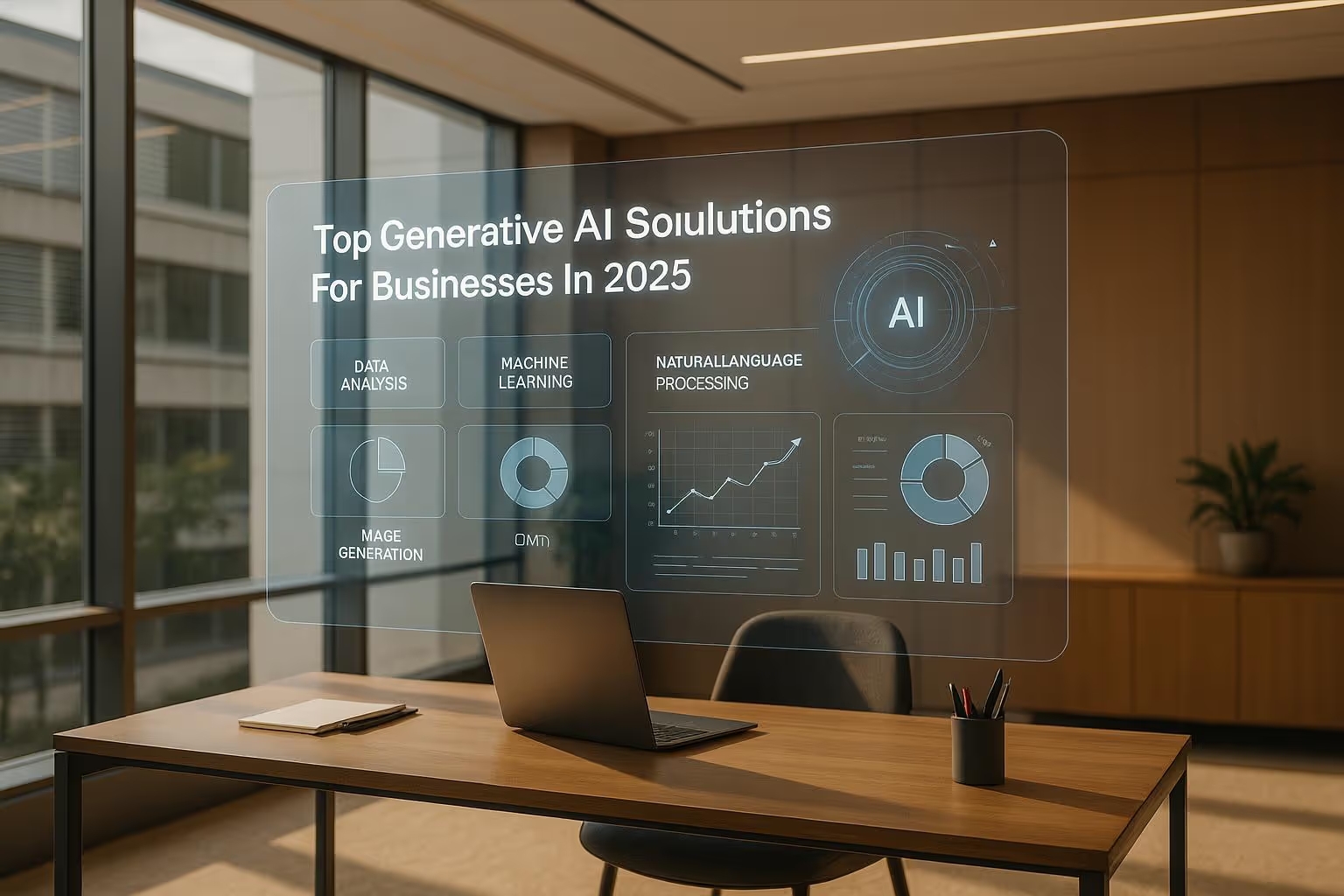
The generative AI market in 2025 is reshaping how businesses operate, offering tools that reduce costs, improve efficiency, and streamline workflows. Companies no longer ask if they should adopt AI but focus on choosing the right solution. Here’s a quick look at five leading platforms:
Each platform addresses specific business needs, from cost control to compliance, making it easier for teams to focus on strategic goals. Below is a comparison table summarizing their strengths and best use cases.
| Platform | Key Strengths | Best Use Cases |
|---|---|---|
| Prompts.ai | Centralized AI models, cost control | Large enterprises, AI-heavy workflows |
| Domo | Data visualization, AI-driven analytics | Data-focused organizations, BI teams |
| Diaflow | Document process automation | Quick deployment, non-technical teams |
| FlowForma | Compliance tools, process standardization | Regulated industries, workflow management |
| Lindy | Task automation, strong security | Healthcare, financial services |
These tools reflect how AI is transforming industries by addressing specific challenges and aligning with enterprise goals. Choosing the right one depends on your business priorities - whether it's reducing costs, improving workflows, or ensuring compliance.
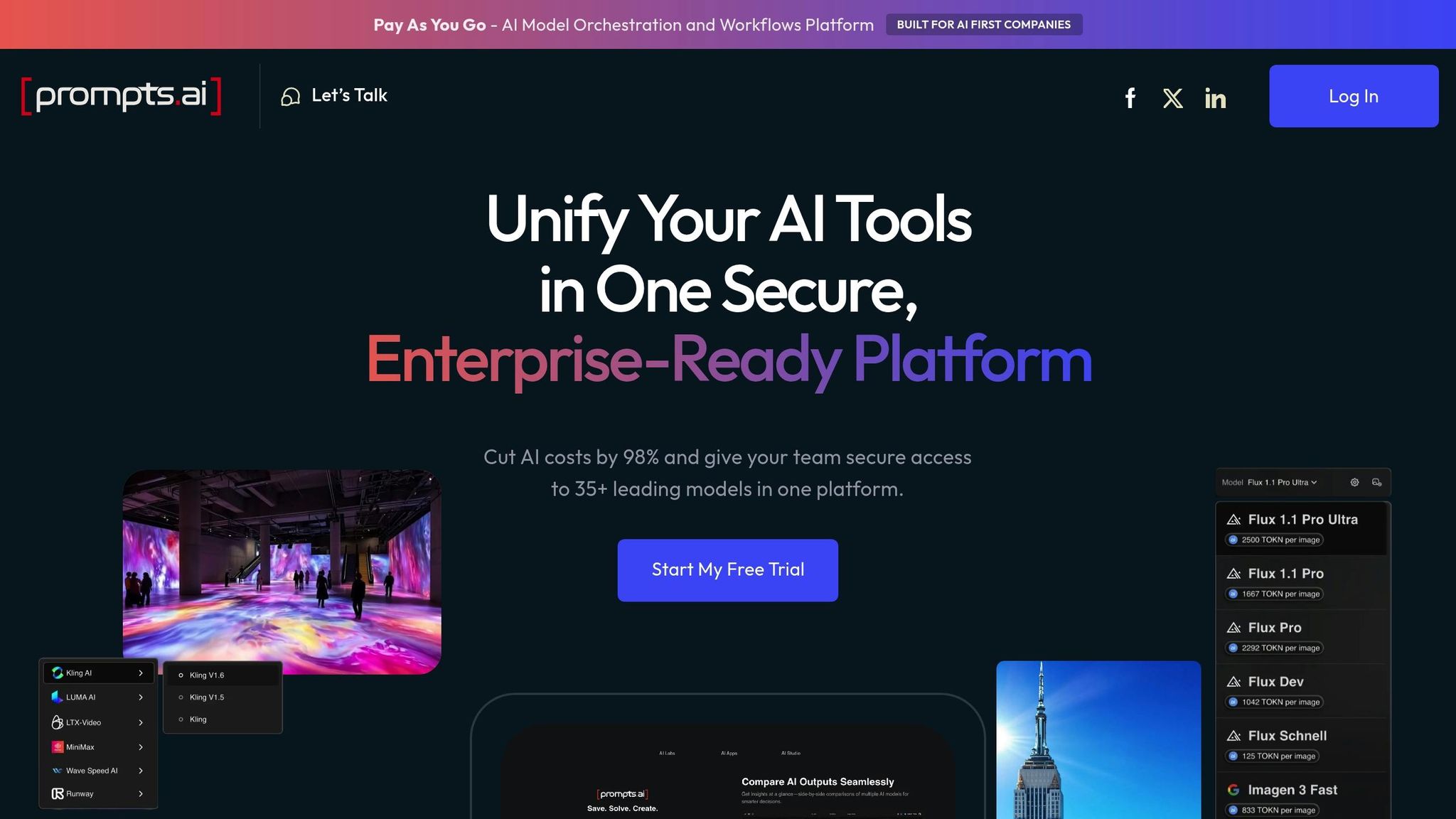
Prompts.ai is a robust platform designed to streamline enterprise AI by bringing together over 35 leading large language models - such as GPT-5, Claude, LLaMA, and Gemini - into one secure interface. By consolidating tools across departments, it eliminates the inefficiencies of managing multiple AI systems while ensuring strict governance standards are upheld.
More than just a tool hub, Prompts.ai transforms scattered AI experiments into scalable, repeatable business processes that deliver real results. Companies using the platform have reported reducing AI software costs by up to 98% and achieving a 10× boost in productivity.
Prompts.ai makes connecting with existing tools like Slack, Gmail, and Trello quick and seamless, removing common hurdles when integrating AI into established workflows.
The platform supports integration through RESTful APIs, pre-built connectors, and SDKs compatible with major programming languages. Its tech stack - featuring Python, LangChain, FastAPI, Docker, and PostgreSQL - ensures reliable, scalable, and asynchronous deployments. For businesses already leveraging platforms like Zapier, Prompts.ai extends connectivity to hundreds of additional applications, all without requiring a major overhaul of current systems.
Prompts.ai stands out for its ability to automate repetitive tasks around the clock. Marketing teams can rely on it for content creation and campaign reporting, while finance departments can streamline data analysis and report generation. Not only does this save time, but the workflows also improve over time through continuous learning.
Users can design custom automation pipelines triggered by specific prompts or business events. For critical tasks, human-in-the-loop (HITL) workflows ensure quality control and oversight. The platform also supports agent-based LLM systems and RAG pipelines, enabling businesses to create advanced AI copilots and schedulers that seamlessly integrate into daily operations.
Prompts.ai is built with a compliance-first approach, making it ideal for industries like healthcare and finance that operate under strict regulatory frameworks. Adhering to standards such as SOC 2 Type II, HIPAA, and GDPR, the platform ensures that data remains secure and governance requirements are met.
The platform provides full visibility and auditability of all AI interactions, allowing organizations to maintain control at scale without stifling innovation. Continuous monitoring through tools like Vanta ensures SOC 2 Type II compliance, and users can check the platform's real-time security posture via its Trust Center at https://trust.prompts.ai/.
Prompts.ai also offers features like role-based access controls, audit logging, and support for private cloud and on-premises deployments, ensuring sensitive data stays secure. These measures enable businesses to manage AI operations efficiently while keeping costs in check.
Prompts.ai provides tools to manage and optimize AI costs effectively. Its financial tracking layer monitors usage, aligning spending with outcomes. Flexible pricing options, including pay-as-you-go TOKN credits, eliminate the need for recurring subscription fees, ensuring companies pay only for what they use.
With usage analytics and budget alerts, businesses can allocate resources wisely - using lower-cost models for routine tasks and reserving premium models for critical operations. This level of control allows organizations to scale AI usage strategically while avoiding unexpected expenses.
The platform also offers hybrid deployment options, including private cloud, hybrid cloud, and on-premises setups. These options allow businesses to tailor their infrastructure to meet specific performance and budget goals, ensuring every dollar spent contributes to meaningful outcomes.
Built on a microservice architecture, Prompts.ai supports scalable deployments that grow alongside business needs. Compatibility with frameworks like LangChain and LlamaIndex allows technical teams to leverage their existing tools and expertise.
The platform prioritizes speed and efficiency, with many AI workflows operational in just 2–4 weeks. This rapid deployment helps businesses quickly demonstrate ROI, fostering momentum for broader AI adoption.
Comprehensive APIs and development tools make it easy to create custom integrations with internal databases, cloud storage systems, or specialized applications. Even organizations with unique technical requirements can scale their AI initiatives without sacrificing functionality or security.
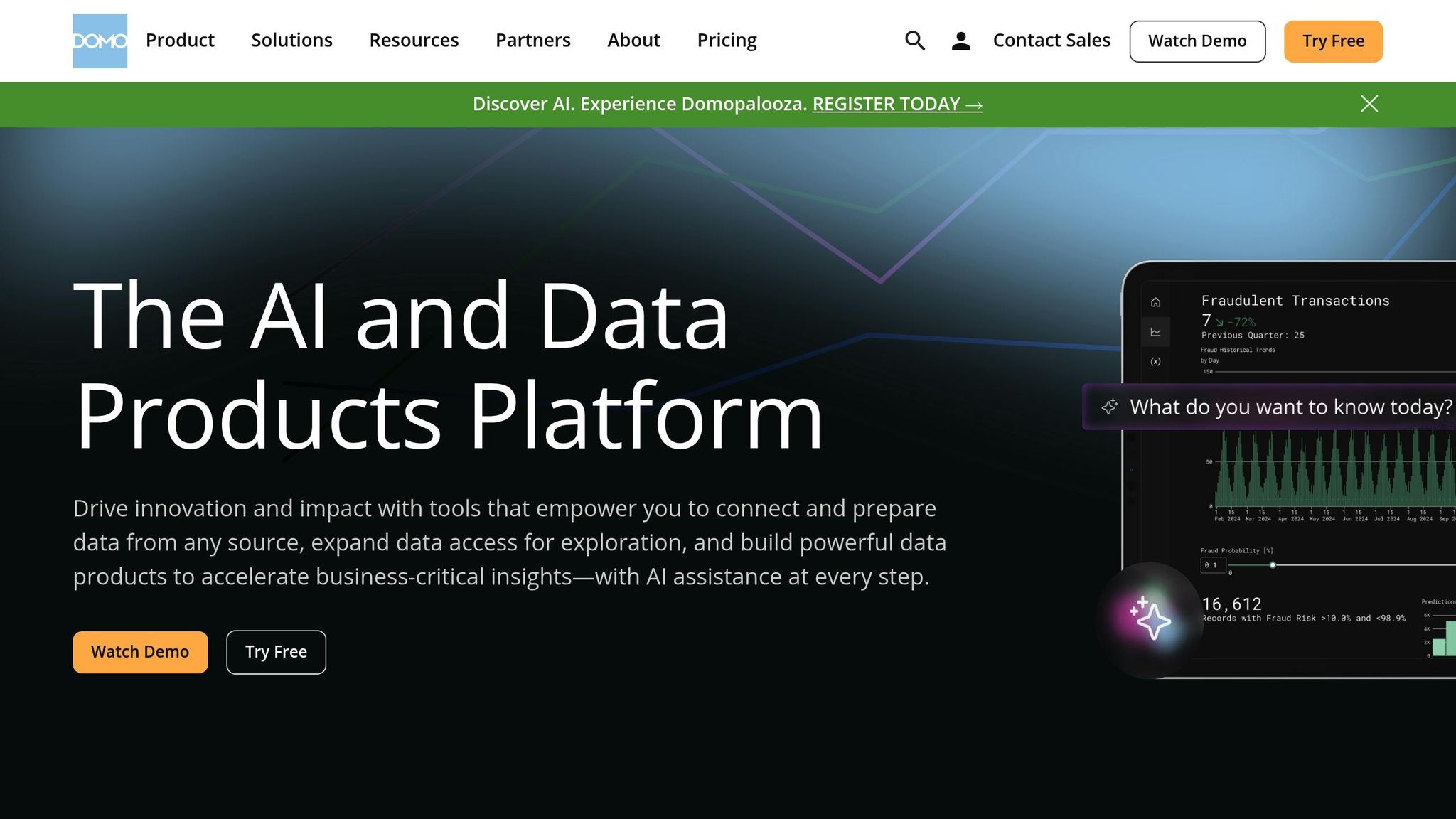
Building on Prompts.ai's advanced AI workflow automation, Domo takes a step further by blending cutting-edge business intelligence with seamless analytics powered by generative AI.
Domo is a cloud-native business intelligence platform that integrates data visualization with AI-driven analytics. Unlike tools that focus solely on automating internal processes, Domo transforms complex datasets into actionable insights, enhancing decision-making across organizations. By merging traditional BI tools with AI capabilities, it delivers a solution that helps businesses convert raw data into meaningful strategies.
The platform’s standout feature is its ability to connect diverse data sources, generating automated reports, dashboards, and predictive analytics. Key AI-driven tools include natural language querying, automated anomaly detection, and smart data preparation, all aimed at minimizing repetitive data tasks.
Domo shines in its ability to connect with existing enterprise systems, offering an extensive library of over 1,000 pre-built connectors. These include popular applications like Salesforce, HubSpot, and Google Analytics, as well as major cloud platforms such as AWS and Microsoft Azure.
The Magic ETL tool simplifies data transformation and preparation, allowing teams to build visual data workflows without needing deep technical expertise. This pipeline builder ensures that data workflows sync seamlessly across multiple systems, maintaining consistency in analytics and reporting.
For businesses operating in multi-cloud environments, Domo's federated approach allows data to stay in its original location while still being accessible for AI-powered analysis. This setup helps reduce costs associated with data movement while meeting strict security requirements, making Domo a versatile choice for enterprises.
Domo’s automation features revolve around real-time monitoring and automated workflows. The platform can track key business metrics and initiate workflows when specific conditions or anomalies are detected.
The Beast Mode feature enables users to create custom metrics that automatically update across all dashboards and reports, eliminating the need for manual recalculations and ensuring a unified approach to data analysis.
With AI-powered DataSet Views, the platform can generate tailored perspectives of the same data for different stakeholders. This reduces the workload for data teams while ensuring every department receives insights relevant to their needs.
Domo prioritizes governance and security with role-based access controls and detailed audit trails, which track who accesses specific data and when. This balance of control and self-service analytics ensures both security and user autonomy.
The platform is SOC 2 Type II certified and meets GDPR compliance standards. Data is encrypted during transit and at rest, with added security measures such as single sign-on (SSO) and multi-factor authentication. For organizations with strict data residency requirements, Domo offers deployment options to keep sensitive data within designated geographic regions while maintaining AI-driven analytics capabilities.
Domo’s pricing is based on user licenses rather than data volume, which can benefit organizations handling large datasets but with fewer users. However, this structure may become costly for companies aiming to provide widespread access across teams.
Usage analytics tools help administrators identify which features and datasets are most utilized, enabling smarter decisions around license allocation and adoption of platform capabilities.
With Domo Everywhere, organizations can embed analytics into existing applications, reducing the need for additional user licenses. This feature allows end customers or partners to access AI-powered insights without requiring direct access to the platform.
Domo’s Developer Studio offers APIs and SDKs for creating custom integrations with proprietary systems or industry-specific applications. It supports REST and GraphQL APIs, providing flexibility for external integrations.
For teams already using data science tools, Domo integrates with Python, R, and Jupyter notebooks, enabling data scientists to continue working in their preferred environments while leveraging Domo’s robust infrastructure.
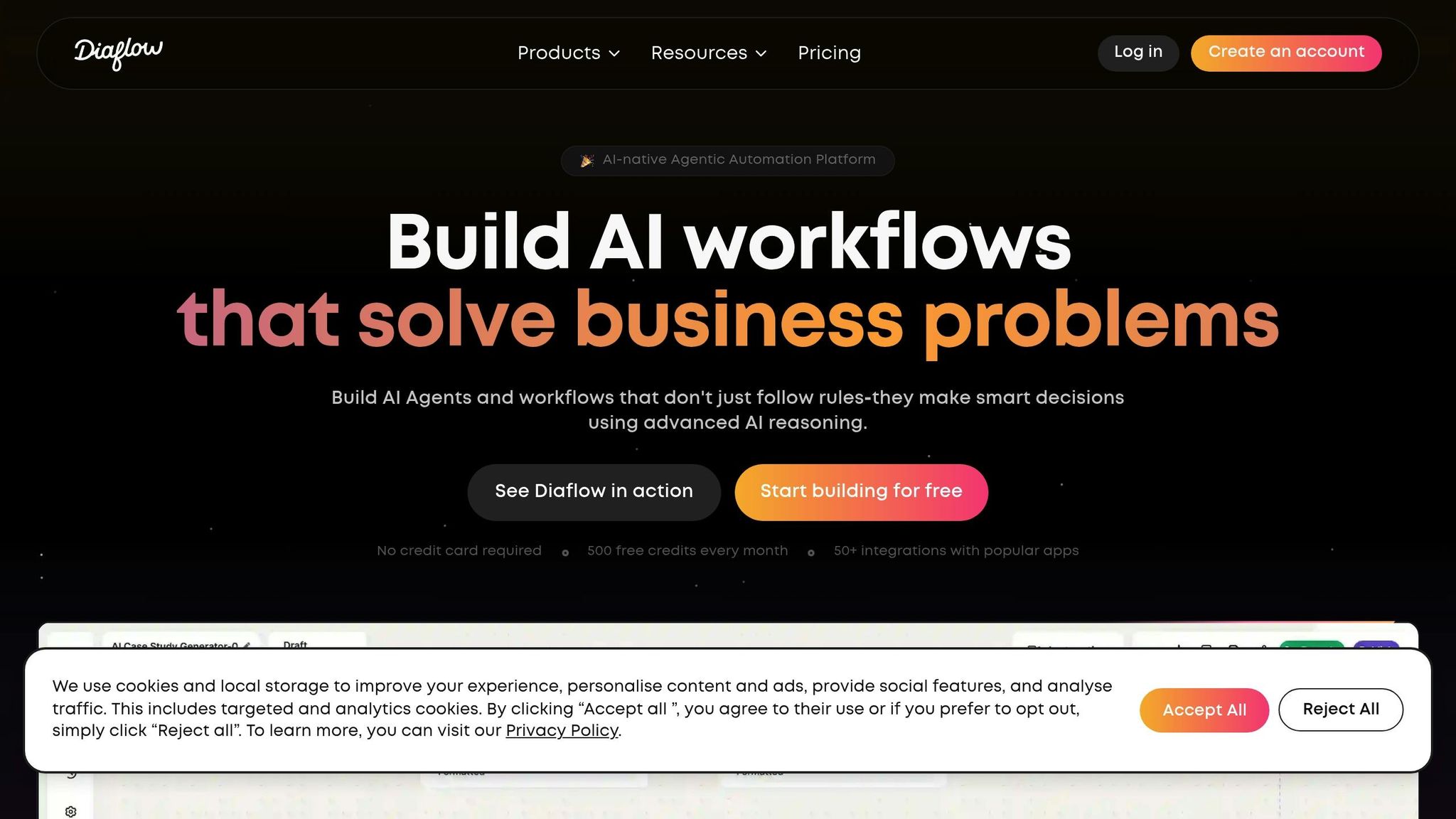
Diaflow is a generative AI-powered platform tailored for managing business processes, specifically those revolving around documents. It simplifies and automates tasks like processing invoices, managing contracts, and ensuring compliance, significantly cutting down manual effort while boosting efficiency. This targeted approach to document-heavy workflows sets it apart in the crowded AI market.
While information about Diaflow's governance and security protocols is still sparse, its focus on optimizing document workflows aligns with the broader trend of AI-driven process improvements shaping the market landscape in 2025.
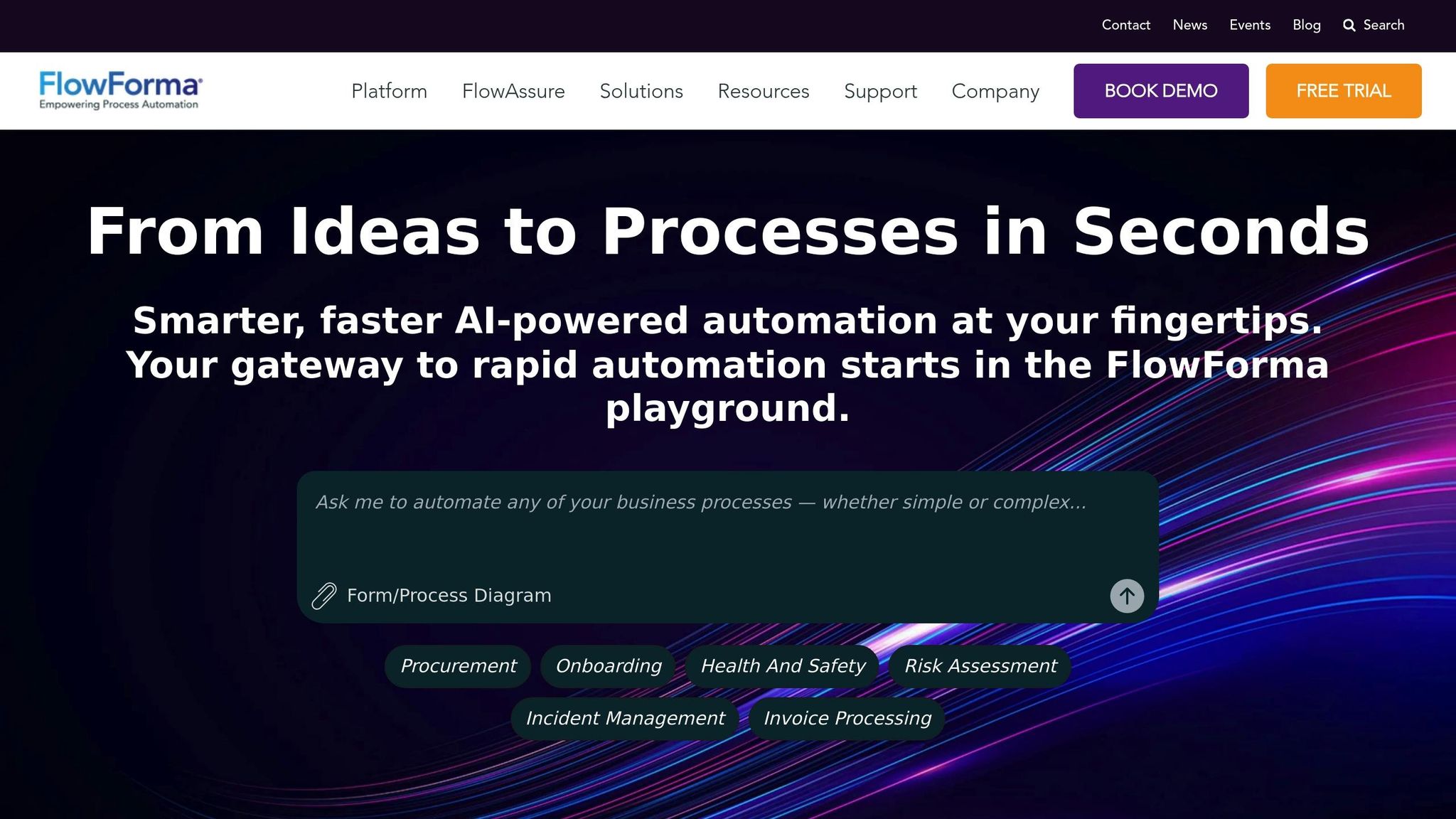
FlowForma prioritizes protecting sensitive business data while ensuring adherence to industry regulations. The platform incorporates role-based access controls, allowing administrators to define user permissions and restrict access to specific workflows and data. To enhance transparency, it maintains comprehensive audit trails that log all workflow activities, providing a clear record of actions.
Security is further reinforced through data encryption, both during transmission and when stored, safeguarding information at every stage. Additionally, FlowForma supports secure authentication methods, including single sign-on (SSO), streamlining access while maintaining robust security protocols.
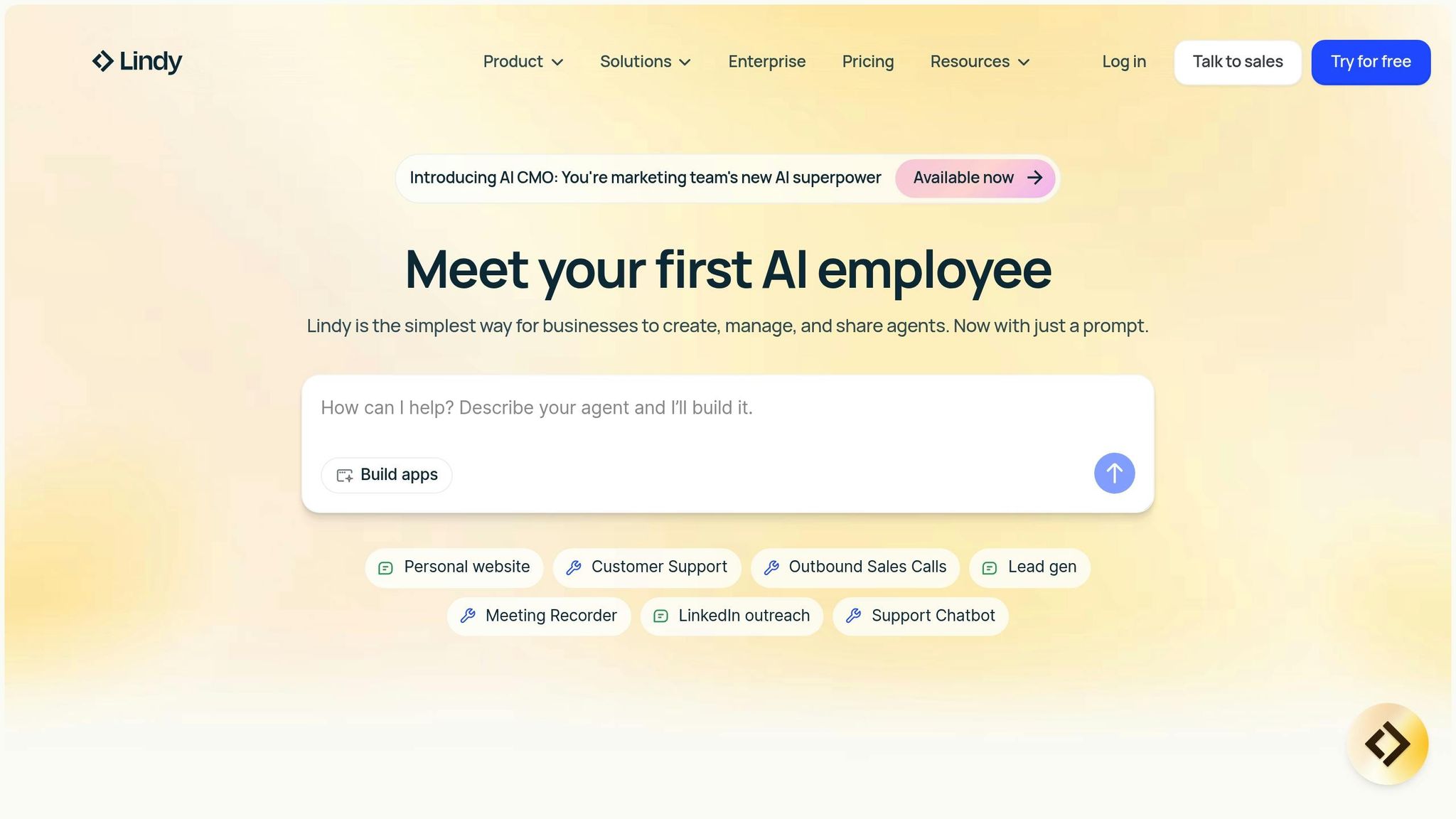
Lindy is an AI-driven platform designed to automate workflows and simplify complex processes. By focusing on intelligent automation, it helps businesses handle tasks like data processing and customer communications with minimal manual effort, ensuring accuracy and consistency. Its emphasis on security and efficiency positions Lindy as a key tool for modern business operations.
Lindy allows users to create automated workflows for tasks such as email management, data entry, scheduling, and customer service. These workflows can be triggered by events, set schedules, or manual activation, offering flexibility to fit various operational needs. By introducing automation, Lindy ensures consistency and aligns with the growing trend of integrating AI into everyday business functions.
Lindy prioritizes security and compliance, meeting enterprise standards and regulatory requirements. The platform holds SOC 2 Type II certification, confirming the reliability of its security controls through regular testing and independent audits.
For organizations in healthcare or those handling sensitive health data, Lindy is HIPAA-compliant, ensuring the protection of PHI. Many U.S. clinics already rely on Lindy to manage sensitive information, showcasing its dedication to maintaining strict compliance.
Lindy’s data security measures include AES-256 encryption for data at rest and TLS 1.2+ for data in transit, along with encrypted backups and secure key management. Hosted on the Google Cloud Platform, Lindy benefits from multi-zone redundancy, automated security updates, and tightly controlled access to cloud storage systems.
Access control is further strengthened by features like Role-Based Access Control (RBAC), multi-factor authentication (MFA), and automated account deprovisioning. These measures ensure users only access the data and tools relevant to their roles, enhancing overall security.
Lindy supports seamless integration through APIs, pre-built connectors, and webhooks, enabling real-time data exchange and direct database connections. It works with email systems, CRM platforms, project management tools, and document storage services. Additionally, Lindy can connect directly to databases for automated data processing. By offering flexible integration options, Lindy helps businesses improve efficiency and streamline operations.
Each platform offers distinct strengths and trade-offs, catering to different business needs.
Prompts.ai takes the lead in managing AI tool sprawl by integrating more than 35 top language models into one secure interface. Its built-in FinOps features allow businesses to monitor token usage for clear cost control. However, leveraging its advanced features requires some onboarding and training.
Domo shines in data visualization and business intelligence, making it ideal for organizations with established analytics workflows. Its AI-driven dashboards simplify complex datasets into actionable insights. That said, its heavy focus on analytics limits its usefulness for tasks like creative projects or customer service.
Diaflow simplifies document workflows with a visual builder, enabling teams to create intricate processes without needing deep technical expertise. It supports quick deployment but offers fewer customization options compared to code-based solutions. Additionally, integrating with older systems may require extra effort.
FlowForma excels in process management, offering compliance tools and audit trails that help standardize workflows across departments. It’s particularly valuable for industries with strict regulatory requirements. However, its narrow focus on process management makes it less suitable for creative tasks like content generation or marketing automation.
Lindy prioritizes automation with stringent security measures. With SOC 2 Type II certification and HIPAA compliance, it’s an excellent choice for healthcare and financial sectors handling sensitive data. On the flip side, its robust security features can lead to longer setup times.
The table below provides a quick comparison of these platforms:
| Platform | Key Strengths | Considerations | Best Use Cases |
|---|---|---|---|
| Prompts.ai | Centralized access to 35+ LLMs, FinOps for cost control, enterprise-level governance | Requires training to unlock advanced features | Large enterprises, AI-heavy workflows, cost-focused operations |
| Domo | Outstanding data visualization, strong BI integration | Limited to analytics-focused tasks | Data-driven organizations, business intelligence teams |
| Diaflow | Intuitive visual builder, fast deployment | Limited customization, challenges with legacy systems | Process automation, non-technical teams |
| FlowForma | Compliance-focused, strong process standardization | Less applicable for creative or marketing tasks | Regulated industries, workflow standardization |
| Lindy | High-level security, HIPAA compliance | Complex setup and longer deployment timelines | Healthcare, financial services, compliance-heavy environments |
When evaluating these platforms, companies often weigh cost and integration needs heavily. For instance, Prompts.ai offers a pay-as-you-go pricing model, which appeals to businesses aiming for flexibility in spending. Subscription-based platforms like others in this list provide predictable monthly costs but may require additional investment in training, integration, and ongoing maintenance.
Ultimately, selecting the right platform comes down to aligning its technical strengths with your specific business priorities and operational goals.
By 2025, the generative AI landscape is addressing a range of operational challenges with precision, offering solutions tailored to diverse enterprise needs. Among these, Prompts.ai stands out as a leader, delivering a unified AI orchestration platform paired with strict cost management. Its approach exemplifies the growing demand for platforms that combine advanced functionality with financial oversight.
That said, every platform has its own strengths. Choosing the right one depends on your priorities - whether it's advanced analytics, streamlined process automation, or meeting rigorous compliance standards. The industry is moving toward integrated platforms that offer strong governance, real-time cost tracking, and adaptable pricing models. Striking the right balance between powerful capabilities and financial responsibility will be essential for businesses aiming to thrive in this competitive space.
As you weigh your options, consider platforms that not only address your immediate needs but also align with your long-term AI strategy. A scalable, forward-thinking choice will ensure your enterprise remains agile and prepared for the evolving demands of 2025 and beyond.
Choosing the right generative AI platform for your business in 2025 requires careful consideration of a few essential factors. Start by ensuring the platform is designed to address the specific challenges of your industry and aligns with your business objectives. It’s important to look for solutions that not only meet your needs but also help achieve measurable results.
Seamless integration with your current workflows should be a top priority. A platform that fits effortlessly into your operations will save time and reduce disruptions. Customization is another key aspect - select a solution that can adapt to the unique demands and processes of your business.
Don’t overlook the provider’s technical expertise. Their experience with advanced AI models and cutting-edge technologies can make a significant difference in the platform’s performance and reliability. Finally, robust customer support and access to training resources are vital for ensuring a smooth implementation and empowering your team to use the platform effectively.
When bringing a generative AI platform like Prompts.ai into your business operations, it’s important to prioritize scalability, efficiency, and team readiness. Prompts.ai streamlines AI workflows by bringing together over 35 large language models in one place. This allows teams to easily compare models, tailor workflows, and fine-tune outputs without hassle.
To support a seamless integration, Prompts.ai offers enterprise-level onboarding along with a Prompt Engineer Certification program. This program equips teams with the skills needed to design prompts effectively and manage workflows confidently. The platform also features a built-in FinOps layer, enabling real-time monitoring of usage, expenses, and ROI. This ensures your AI efforts remain both cost-efficient and transparent. Together, these tools help you align AI capabilities with your current processes while maximizing their value.
Prompts.ai places a strong emphasis on data security and compliance, employing top-tier encryption methods, secure storage solutions, and strict access controls. These safeguards are designed to protect sensitive information throughout every step of its handling.
The platform also aligns with major regulatory frameworks like GDPR, HIPAA, and CCPA, adapting its offerings to address specific industry compliance requirements. Regular audits and updates ensure that the platform stays up-to-date with changing regulations, offering businesses a dependable and secure environment for their AI operations.


